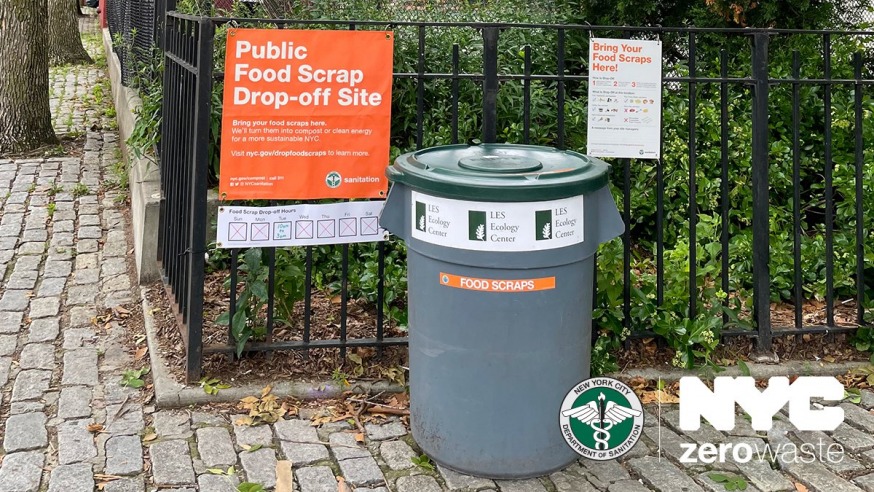
The smart bins are an upgrade from typical food scraps drop off bins, like the one pictured here (DSNY)
Dec. 13, 2021 By Allie Griffin
The New York City Sanitation Department has installed more than a dozen specialty “smart bins” for food scraps throughout Astoria.
The department placed 16 bins — which only open with a specific key card — around the neighborhood last week in order to redirect compostable waste from landfills.
The smart bins are a part of a residential pilot program to test out 24/7 drop-off for compostable materials and food scraps. A similar pilot launched in lower Manhattan last week as well.
The bins are locked and can only be opened with a key card by residents who sign up for the pilot.
Up to a third of the 12,000 tons of trash and recycling that sanitation workers collect in the city each day can be composted, according to DSNY. When organic materials are sent to a landfill, they emit methane and contribute to climate change as opposed to becoming nutrient-rich soil when properly composted.
The pilot is part of DSNY’s effort to increase composting in New York City. The department also offers community-based drop-off sites for food scraps — which are not open 24/7 — and brown bin curbside composting at residential buildings.
“DSNY is committed to getting compostable material out of landfills,” DSNY Commissioner Edward Grayson said. “We are excited to see how these new bins perform, and urge everyone who lives or works near one to give them a try.”
Compostable items that can be placed in the smart bins include all food waste — including meat, bones, dairy items, eggshells, coffee grounds, tea bags and soiled or expired food — as well as food-soiled paper products and dead houseplants and flowers.
The DSNY will empty the smart bins and transport the organic waste to local and regional composting facilities, where it is turned into compost on a large scale. The finished compost is then used in New York City parks and gardens. Some of the organic waste will be converted into renewable energy.
Non-compostable items such as any regular trash (including animal waste and diapers) and recyclable items should never be put in the smart bins.
Residents can sign up by filling out their information on smartcompost.nyc. Once they have filled out a form, a free key card will be mailed to the address they provide within one to two weeks.
The smart bins are mostly located along 31st Avenue and surrounding blocks. The map below shows their exact locations.
4 Comments

I am very heartened the recycling program has returned. Even though technology has advanced,and we are recycling remotely. Why just 16 bins in Astoria? I live in far Rockaway!
Contrary to your web page there is NO COMPOSE BIN in front of LIC High School. I walked the block but there was none to be found. This I did in today’s, January 26th’s weather.
Commies never stop!!
I hope this program expands to Hunters Point/Court Square. My small building won’t participate in the curbside pick up and I would like to be able to participate in the compost program. A perfect spot would be Murray Playground. I had a compost for a short time in the garden there, but it was impossible to keep up with what people would bring and leave for me.